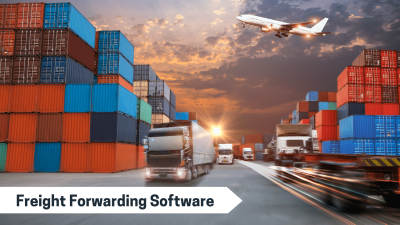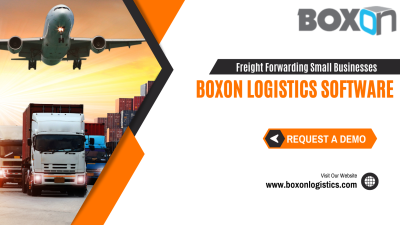What exactly is a platform for digital freight matching?
Software programs called freight marketplace systems or digital freight matching platforms enable businesses to create safe connections between shippers and carriers by using multi-carrier shipping software. A digital marketplace, as opposed to a digital freight brokerage, frequently uses use of smartphone technology. The explanation is sensible: most smart gadgets come with a GPS module, internet access, and a powerful enough CPU to execute the backend functionality of Freight Forwarding Software, Shipping Management Software, and Transport Management System Software.
Shippers’ and carriers’ marketplaces are equivalent to a Digital Freight Matching platform. It enables shippers to match their shipments to the platform’s available carriers’ load capacities. On the other hand, shippers might provide loads to carriers. Thus, both parties can easily and efficiently safeguard their operations. The inventory of shippers and carriers on the Digital Freight Matching platform, however, shows how successful it is.
The “Digital” in Digital Freight Matching: Its Function (DFM)
By integrating digital technologies like big data and web-based cooperation, Digital Freight Matching gets rid of these obstacles. By substituting manual processes with digital ones, errors and delays in decision-making are reduced. Additionally, it makes sure that carrier and shipper data is sufficiently transparent.
A digital freight forwarding software network is an open, completely connected freight market that effectively connects shippers and carriers using machine learning, automation, and other software services.
In the past, when shipping management systems and logistical activities were handled manually, there was a severe lack of transparency. Shippers frequently had to pay additional costs to guarantee the timely delivery of cargo since they lacked access to the carrier’s data and load capacity in Transport Management System. On the other hand, carriers also skipped out on chances that would have been perfectly suited to their load capacities.
Why do logistics companies need digital freight matching platforms, and what are they?
A digital marketplace, as opposed to a digital freight brokerage, makes extensive use of smartphone technology. The reason is straightforward: most devices come with a GPS module, internet access, and a powerful enough CPU to execute the backend functionality.
Online shipping platforms’ digital nature allows freight marketplace administrators to speed up the driver onboarding procedure. A scalable Transport Management System can automatically match drivers with needs.
Drivers can also apply for jobs more quickly because they don’t have to go to offices. Through a dedicated mobile app, the majority, if not all, of application materials can be sent, checked, and signed using digital signatures.
How digital freight matching services may address difficulties related to cost, customers, and speed
The distribution system as a whole can be expanded with the assistance of freight matching services, which also improves last-mile delivery effectiveness. These are not the only problems that digital freight management technologies address, though. Digital freight marketplaces or multi-carrier shipping software can assist with other things like real-time communication, GPS monitoring, secure payments, and document digitization. Some of the services are:
Trying to enhance fraud prevention and data security:
- Working with different drivers and maintaining records is a time-consuming task. Even more challenging is safeguarding records from data loss, hard drive failure, and theft.
- The procedure can be improved using technology. Operational efficiency will arise from using cloud-based tools to power your marketplace.
Artificial Intelligence batching speedup:
- After a certain number of shippers are gathered by a digital marketplace, efficiently batching orders becomes difficult.
- This problem will be resolved by using AI and machine learning technology to power your marketplace.
offering a rewards program for loyal transporters:
- You can manage more operations the more justifications you give drivers to sign up for your marketplace. Businesses can promote their offerings to prospective drivers via digital marketplaces.
- Stakeholders in the platform can monitor how many deliveries a particular driver has made using video telematics and GPS tracking.
Data and records management effectiveness:
- It becomes more difficult to keep data in a clear and useable state as a market grows larger. Records accumulate, bills get unpaid, and resentment grows.
- Big data analytics and cloud technology can help transportation companies store and handle enormous amounts of data quickly and efficiently.
Benefits of a Digital Freight Matching Platform
A digital freight matching platform is a piece of contemporary technology that gives shippers access to various economic advantages:
1. knocks down labor costs:
The freight forwarding software plan experiences quick and noticeable efficiencies thanks to DFM. The digital platform significantly reduces the amount of time and labor required from humans, which benefits the bottom line.
2. Different load endurance scales:
In the past, shippers had to sign long-term contracts with 3PLs to guarantee that load capacity was readily accessible. The lack of an appropriate template for the consignment size, however, made this a significant hardship.
3. Improves shipment handling easier:
The inconsistent nature of the supply and demand forces is one of the main difficulties that a shipper must face. This problem might benefit from having access to historical data. It might provide a shipper with information on when demand may spike or decline.
4. keeps costs down on freight:
A DFM platform’s ability to match carriers to the exact load capacity of the consignment Transport Management Software is one of its main advantages. In a different circumstance, the shipper might be required to engage with a carrier that has a greater load capacity, which could be more expensive and result in a higher freight bill.
Conclusion:
Shipping is one of the greatest costs that businesses frequently need to balance. Even while intermodal mobility, specifically the combination of shipping and over-the-road (OTR) transportation, can somewhat reduce the cost of freight, managing freight expenses
“Your business will benefit from more opportunities if your logistics system embraces new technologies”
The online freight market is expanding, and BoxOn Logistics offers several back-end tools you may employ to improve it even further.
BoxOn Logistics Team is always here to help you with our best Software Solutions like Freight Forwarding Software, Shipping Management Software, Transport Management System Software, and Multi-Carrier Shipping Software.
To get more details https://www.boxonlogistics.com/request-demo/






COMMENTS